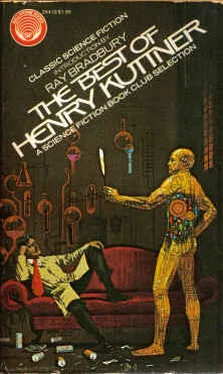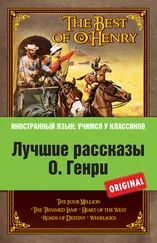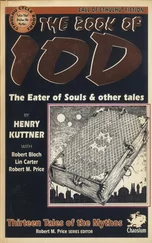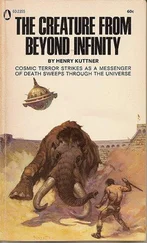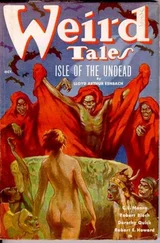“What is it, Denny?”
“Dunno. Who’d leave a box of toys down by the creek?”
“It might have fallen out of a car.”
“Not at that point. The road doesn’t hit the creek north of the railroad trestle. Empty lots — nothing else.” Paradine lit a cigarette. “Drink, honey?”
“I’ll fix it.” Jane went to work, her eyes troubled. She brought Paradine a glass and stood behind him, ruffling his hair with her fingers. “Is anything wrong?”
“Of course not. Only — where did these toys come from?”
“Johnson’s didn’t know, and they get their stock from New York.”
“I’ve been checking up, too,” Paradine admitted. “That doll” — he poked it — “rather worried me.
Custom jobs, maybe, but I wish I knew who’d made ’em.”
“A psychologist? That abacus — don’t they give people tests with such things?”
Paradine snapped his fingers. “Bight! And say, there’s a guy going to speak at the university next week, fellow named Holloway, who’s a child psychologist. He’s a big shot, with quite a reputation. He might know something about it.”
“Holloway? I don’t—”
“Rex Holloway. He’s-hm-m-m! He doesn’t live far from here. Do you suppose he might have had these things made himself?”
Jane was examining the abacus. She grimaced and drew back. “If he did, I don’t like him. But see if you can find out, Denny.”
Paradine nodded. “I shall.”
He drank his highball, frowning. He was vaguely worried. But he wasn’t scared — yet.
Rex Holloway was a fat, shiny man, with a bald head and thick spectacles, above which his thick, black brows lay like bushy caterpillars. Paradine brought him home to dinner one night a week later.
Holloway did not appear to watch the children, but nothing they did or said was lost on him. His gray eyes, shrewd and bright, missed little.
The toys fascinated him. In the living room the three adults gathered around the table, where the playthings had been placed. Holloway studied them carefully as he listened to what Jane and Paradine had to say. At last he broke his silence.
“I’m glad I came here tonight. But not completely. This is very disturbing, you know.”
“Eh?” Paradine stared, and Jane’s face showed her consternation. Holloway’s next words did not calm them.
“We are dealing with madness.”
He smiled at the shocked looks they gave him. “All children are mad, from an adult viewpoint. Ever read Hughes’ High Wind in Jamaica?”
“I’ve got it.” Paradine secured the little book from its shelf. Holloway extended a hand, took the book and flipped the pages till he had found the place he wanted. He read aloud: Babies, of course, are not human — they are animals, and have a very ancient and ramified culture, as cats have, and fishes, and even snakes; the same in kind as these, but much more complicated and vivid, since babies are, after all, one of the most developed species of the lower vertebrates. In short, babies have minds which work in terms and categories of their own, which cannot be translated into the terms and categories of the human mind.
Jane tried to take that calmly, but couldn’t. “You don’t mean that Emma—”
“Could you think like your daughter?” Holloway asked. “Listen: ‘One can no more think like a baby than one can think like a bee.”
Paradine mixed drinks. Over his shoulder he said, “You’re theorizing quite a bit, aren’t you? As I get it, you’re implying that babies have a culture of their own, even a high standard of intelligence.”
“Not necessarily. There’s no yardstick, you see. All I say is that babies think in other ways than we do. Not necessarily better — that’s a question of relative values. But with a different matter of extension.”
He sought for words, grimacing.
“Fantasy,” Paradine said, rather rudely but annoyed because of Emma. “Babies don’t have different senses from ours.”
“Who said they did?” Holloway demanded. “They use their minds in a different way, that’s all. But it’s quite enough!”
“I’m trying to understand,” Jane said slowly. “All I can think of is my Mixmaster. It can whip up batter and potatoes, but it can squeeze oranges, too.”
“Something like that. The brain’s a colloid, a very complicated machine. We don’t know much about its potentialities. We don’t even know how much it can grasp. But it is known that the mind becomes conditioned as the human animal matures. It follows certain familiar theorems, and all thought thereafter is pretty well based on patterns taken for granted. Look at this.” Holloway touched the abacus. “Have you experimented with it?”
“A little,” Paradine said.
“But not much, eh?”
“Well—”
“Why not?”
“It’s pointless,” Paradine complained. “Even a puzzle has to have some logic. But those crazy angles—”
“Your mind has been conditioned to Euclid,” Holloway said. “So this — thing — bores us, and seems pointless. But a child knows nothing of Euclid. A different sort of geometry from ours wouldn’t impress him as being illogical. He believes what he sees.”
“Are you trying to tell me that this gadget’s got a fourth-dimensional extension?” Paradine demanded.
“Not visually, anyway,” Holloway denied. “All I say is that our minds, conditioned to Euclid, can see nothing in this but an illogical tangle of wires. But a child — especially a baby —might see more. Not at first. It’d be a puzzle, of course. Only a child wouldn’t be handicapped by too many preconceived ideas.”
“Hardening of the thought arteries,” Jane interjected.
Paradine was not convinced. “Then a baby could work calculus better than Einstein? No, I don’t mean that. I can see your point, more or less clearly. Only—”
“Well, look. Let’s suppose there are two kinds of geometry; we’ll limit it, for the sake of the example. Our kind, Euclidean, and another, we’ll call x. X hasn’t much relationship to Euclid. It’s based on different theorems. Two and two needn’t equal four in it; they could equal y 2, or they might not even equal. A baby’s mind is not yet conditioned, except by certain questionable factors of heredity and environment. Start the infant on Euclid—”
“Poor kid,” Jane said.
Holloway shot her a quick glance. “The basis of Euclid. Alphabet blocks. Math, geometry, algebra — they come much later. We’re familiar with that development. On the other hand, start the baby with the basic principles of our x logic.”
“Blocks? What kind?”
Holloway looked at the abacus. “It wouldn’t make much sense to us. But we’ve been conditioned to Euclid.”
Paradine poured himself a stiff shot of whisky. “That’s pretty awful. You’re not limiting to math.”
“Right! I’m not limiting it at all. How can I? I’m not conditioned to x logic.”
“There’s the answer,” Jane said, with a sigh of relief. “Who is? It’d take such a person to make the sort of toys you apparently think these are.”
Holloway nodded, his eyes, behind the thick lenses, blinking. “Such people may exist.”
“Where?”
“They might prefer to keep hidden.”
“Supermen?”
“I wish I knew. You see, Paradine, we’ve got yardstick trouble again. By our standards these people might seem superdupers in certain respects. In others they might seem moronic. It’s not a quantitative difference; it’s qualitative. They think different. And I’m sure we can do things they can’t.”
“Maybe they wouldn’t want to,” Jane said.
Paradine tapped the fused gadgetry on the box. “What about this? It implies—”
“A purpose, sure.”
Читать дальше
